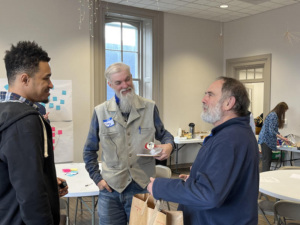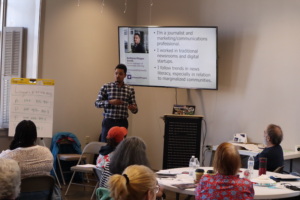
Deterring violence through news literacy in South Central Pennsylvania
Something unusual is happening in a cluster of South Central Pennsylvania counties: Despite today’s divisive climate, people from different ideological, racial and generational backgrounds are coming together to solve some of their community’s most pressing problems.
They’re doing it, partly, by becoming more news-literate.
Led by Urban Rural Action, a nonprofit dedicated to bringing people together across divides to address common challenges, a group of more than two dozen concerned community members will work collaboratively over the next 18 months to take action to deter targeted violence in their counties. Urban Rural Action calls the participants “Uniters.”
As part of the program, the News Literacy Project will present a series of training events to help communities learn to identify credible news sources, spot misinformation and stop its spread. NLP will also work with local partners to host four training sessions through the spring for community members across Pennsylvania.
The group kicked off its work in Gettysburg this winter and will continue meeting, learning and working with each other through August 2024. Participants come from Adams, Franklin, Dauphin and York counties — areas that were selected because independent risk assessments suggest they are at high risk for acts of targeted violence. Participants were chosen through an application process to ensure a group of diverse viewpoints and experiences.
What does news literacy have to do with preventing violence? Plenty, said Joe Bubman, the founder and executive director of Urban Rural Action.

Bubman said a significant part of his organization’s work centers on promoting constructive dialogue among groups that don’t often interact. Getting those conversations started isn’t easy, with skeptical participants often asking, “How can you dialogue with those people when we can’t even agree on facts?” Bubman said.
“We think that has to do with misinformation,” he added. “If you’re going to have more constructive conversations, it’s going to help if community members are better equipped with news literacy skills.”
Kira Hamman, senior director of Urban Rural Action, added that consuming misinformation can be a risk factor that contributes to people carrying out acts of targeted violence. The group defines targeted violence as physical violence aimed at people or groups because of their perceived identity or affiliation; it is intended to intimidate, coerce or bring attention to the perpetrator’s grievance.
So, on a recent Saturday afternoon, a group of about 30 people filed into a community center in Chambersburg, Pennsylvania, to learn how to be more news-literate and prevent the spread of misinformation. DeMario Phipps-Smith, NLP’s senior manager of community learning, explained to the group how to tell the difference between information meant to persuade versus inform. He gave tips for analyzing news for credibility, like looking for multiple sources quoted or cited in stories. Together, the group analyzed headlines and social media posts to spot biased language.

Phipps-Smith said one of the biggest takeaways participants shared was the need to check their own biases, and many realized how easy it is to get trapped in information bubbles that reinforce existing beliefs.
Despite the thorny issues tackled in previous sessions, Phipps-Smith said that the participants concluded that their conversations about misinformation had been the most charged.
“They were like, ‘Maybe that’s a sign,’” he said. “I think it opened people’s eyes to the misinformation crisis and just how important it is to have conversations with people who think differently than you.”
